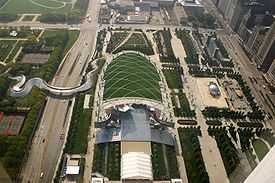Chicago Park District
The Chicago Park District is the oldest and (financially) largest park district in the U.S.A, with a $385 million annual budget. It has the distinction of spending the most per capita on its parks, even more than Boston in terms of park expenses per capita. Today, there are over 570 parks included in the Chicago Park District as well as 31 beaches and 2 conservatories. The parks are also host to sports and recreational programs throughout the year. The district is an independent taxing authority as defined by Illinois State Statute and is considered a separate (or "sister") agency of the City of Chicago. The Park District's General Superintendent & CEO – currently Michael P. Kelly – is appointed by the Mayor of Chicago and confirmed by the Board of Commissioners.[1] The Chicago Park District's Headquarters are located in the Time-Life Building in the Streeterville neighborhood.
Jurisdiction

The Chicago Park District oversees more than 580 parks with over 8,100 acres (3,300 ha) of municipal parkland as well as 24 beaches, 77 pools, 11 museums, two world-class conservatories, 16 historic lagoons and 10 bird and wildlife gardens that are found within the city limits.[2] A number of these are tourist destinations, most notably Lincoln Park, Chicago's largest park which has over 20 million visitors each year, second only to Central Park in New York City.[3] Thanks to 10 lakefront harbors located within a number of parks along the lakefront, the Chicago Park District is also the nation's largest municipal harbor system.
A number of Chicago Park District parks are located in the vicinity of or even adjacent to a number of Chicago Public Schools. This design was done in order to make it easier for public school students and faculty to incorporate school assignments or physical activities into the learning experience. Additionally, a number of Chicago Public Library locations are located within Chicago Park District facilities.
History
In the 1860s, Chicago already had about 40 small parks, but no central plan, and it fell far short when compared to other major cities in the country. Lincoln Park was Chicago's first large park, created in 1843. Dr. John H. Rauch MD, who was a member of the Chicago Board of Health and later a president of the Illinois State Board of Health, played a key role in establishing Lincoln Park by persuading city officials to close several festering cemeteries filled with shallow graves of victims of infectious epidemics. Rauch next formulated a central plan for parks across the entire city, noting that they were "the lungs of the city", and pointing out that Chicago's parks were inferior to those in New York's Central Park, Baltimore's Druid Park, and Philadelphia's Fairmount Park. His influence was key in setting up Chicago's modern park system.[4]
The current Chicago Park District was created in 1934 by the Illinois Legislature under the Park Consolidation Act. By provisions of that act, the Chicago Park District consolidated and superseded the then-existing 22 separate park districts in Chicago, the largest three of which were the Lincoln Park, West Park, and South Park Districts, all of which had been established in 1869.
The agency was long considered a dumping ground for political appointees; most famously, it was run by Ed Kelly, one of the "Eddies" who frustrated Mayor Harold Washington in the 1980s. The size and personnel of the park district was dramatically pared down during the reform administration of Mayor Richard M. Daley-appointed CEO Forrest Claypool in the mid-1990s.
During Tim Mitchell's tenure, the park district has initiated a program of renovating and beautifying existing parks and initiating the building of a number of new parks in recent years such as Ping Tom Memorial Park, DuSable Park and most notably Millennium Park. The Chicago Park District has also made an effort to return programming to the neighborhoods through the parks and created a lakefront concert venue on Northerly Island on the site of the former Meigs Field airport.
Museum in the Park
Park District land hosts 11 museums in locations around the city.[5]
Image gallery
-

Buckingham Fountain, Grant Park
-
Flagstone steps in Portage Park
-

Osaka Japanese Garden in Jackson Park
-

Lincoln Park Zoo
-

Lincoln Park in winter
-

Millennium Park
-

Montrose Beach
-

Oak Street Beach
See also
References
- ↑ Office of the General Superintendent & Chief Executive Officer
- ↑ "About the Chicago Park District". Chicago Park District. Retrieved 16 November 2012.
- ↑ "City Park Facts". The Trust for Public Land, Center for City Park Excellence. June 2006. Retrieved 2006-07-19.
- ↑ William K. Beatty (1991) "John H. Rauch - Public Health, Parks, and Politics" Proceedings of the Institute of Medicine of Chicago Vol. 44 pp. 97-118
- ↑ "Museums In the Park: About Us". Retrieved 2013-05-27.
